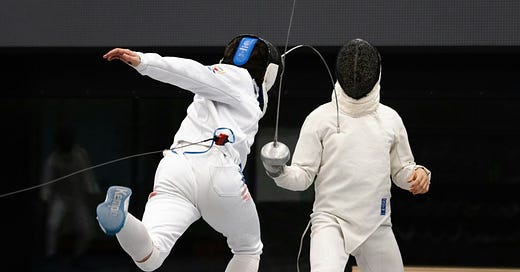Twenty years ago, my husband Doug and I decided to take up fencing.
No, this is not my husband and me. It is a photo by Nathanaël Desmeules on Unsplash
Before investing in any equipment, we began with lessons. It would be an inexpensive way to try out the sport, we thought, as the fencing club would provide all the gear we needed. It would be a fun thing to do together, something new and active that would help to keep us fit. I remember watching our lithe young instructors prance around the gym—clothed all in white, foils held high—during their demonstrations at the beginning of each class. There was something so exciting, energetic, and elegant about it all. I fancied that if we kept at it, someday, we too could look like our young teachers—advancing, lunging, and parrying.
It was fun, as long as Doug was my opponent. But about six weeks in, our instructors staged a mini-tournament during which we faced new antagonists. And I got a bully. At least that’s how it seemed to me. I remember feeling completely unprepared for my new opponent’s intensity and caught off guard as he kept coming toward me, stabbing me repeatedly. I remember being surprised at how much his touches hurt; my husband’s had never hurt that way. I remember amid his attack, the words that kept going through my head were, “This is NOT fun!” My chest was covered in small, round bruises for weeks afterward—souvenirs of my short-lived enthusiasm for the sport.
I’ve thought of my encounter with fencing—which ended abruptly that night—as I’ve processed the pain of some of the losses that have come with my husband’s dementia. Because dementia is also a bully. And this is not fun.
Physical hits
We’ve all felt the physical hit that can accompany a strong emotional response to an unexpected, unwanted occurrence. A pain so undeniable, that we experience it as a sharp and sudden stabbing deep inside our body.
It’s a feeling that has become more familiar to me, as loss piles upon loss.
I felt it during Doug’s first cognitive assessment almost a year and a half ago—when his assessor asked him what a wristwatch and a ruler had in common, and he replied, “They both have numbers. And they both tell time.”
I felt it one evening last summer when Doug—who has followed Christ for more than 40 years—sat with me on our balcony enjoying the sunset. Out of nowhere, he asked, “I know God is our Father, and Jesus is our Saviour. But who’s that other guy and what does he do?”
I felt it as I drove through still-dark streets one morning last fall, and reflected on the fact that I was en route to my first-ever gathering organized by the Alzheimer’s Society for caregivers of persons with dementia, but that it likely would not be my last.
I felt it when we sat in a dinner theatre with friends one evening, and Doug, hearing the meal options leaned across the table and asked me, “What’s roast beef?”
I felt it one morning when the toilet stopped up and he panicked. I reassured him, “It’s okay, it just needs plunging. I’ll get the plunger.” And this man—whose father and four uncles had been plumbers and who had spent his childhood sitting on the toolbox, handing them tools like a surgeon’s assistant—asked me, “What’s a plunger?”
I felt it the first time I used one of these. And the second time, and the third.
These downloadable “Caregiver Cards” are available for free from: The Alzheimer’s Society
I felt it the first time I watched as my husband, who always made the omelettes in our family, stood in front of the stove, an egg in hand, not knowing how to begin.
I felt it the first time he asked me to spell a word for a label he was writing and said, “How do you make a ‘C’?”
I felt it when I realized I needed to change my Power of Attorney because Doug could no longer be trusted to make medical decisions on my behalf.
Feeling seen
“Saying goodbye to someone who has dementia is not a one-time event. You do it over and over again each time you see a new loss,” writes Pauline Boss, PhD, in her wonderful book Loving Someone Who Has Dementia. Reading that book made me feel seen.
But something else has made me feel seen over the past year: a former pastor, hearing of Doug’s dementia, reached out to my husband in kindness to offer monthly FaceTime calls. The pastor calls them “life coaching” sessions, but I think it’s really just an excuse for him to show friendship and encouragement to Doug.
For months, he asked Doug to regularly read and meditate on Psalm 27. Over time, it became something we mostly did together. More recently, Doug’s assignment has been to read and reflect on Psalm 46.
I suspect that our former pastor knew I might need the words of these ancient hymns as much as Doug would, for each time I read them, they feel like a balm for the bruises on my soul.
I believe that I shall see the goodness of the Lord
in the land of the living.
Wait for the Lord;
be strong, and let your heart take courage;
wait for the Lord! – Psalm 27:13-14
And …
God is our refuge and strength,
A very present help in trouble.
Therefore, we will not fear. – Psalm 46:1-2a





I felt each jab of those fencing parries as you listed Doug’s mental diminishments. Praying today for you.
I like the pastor you mention in this post!